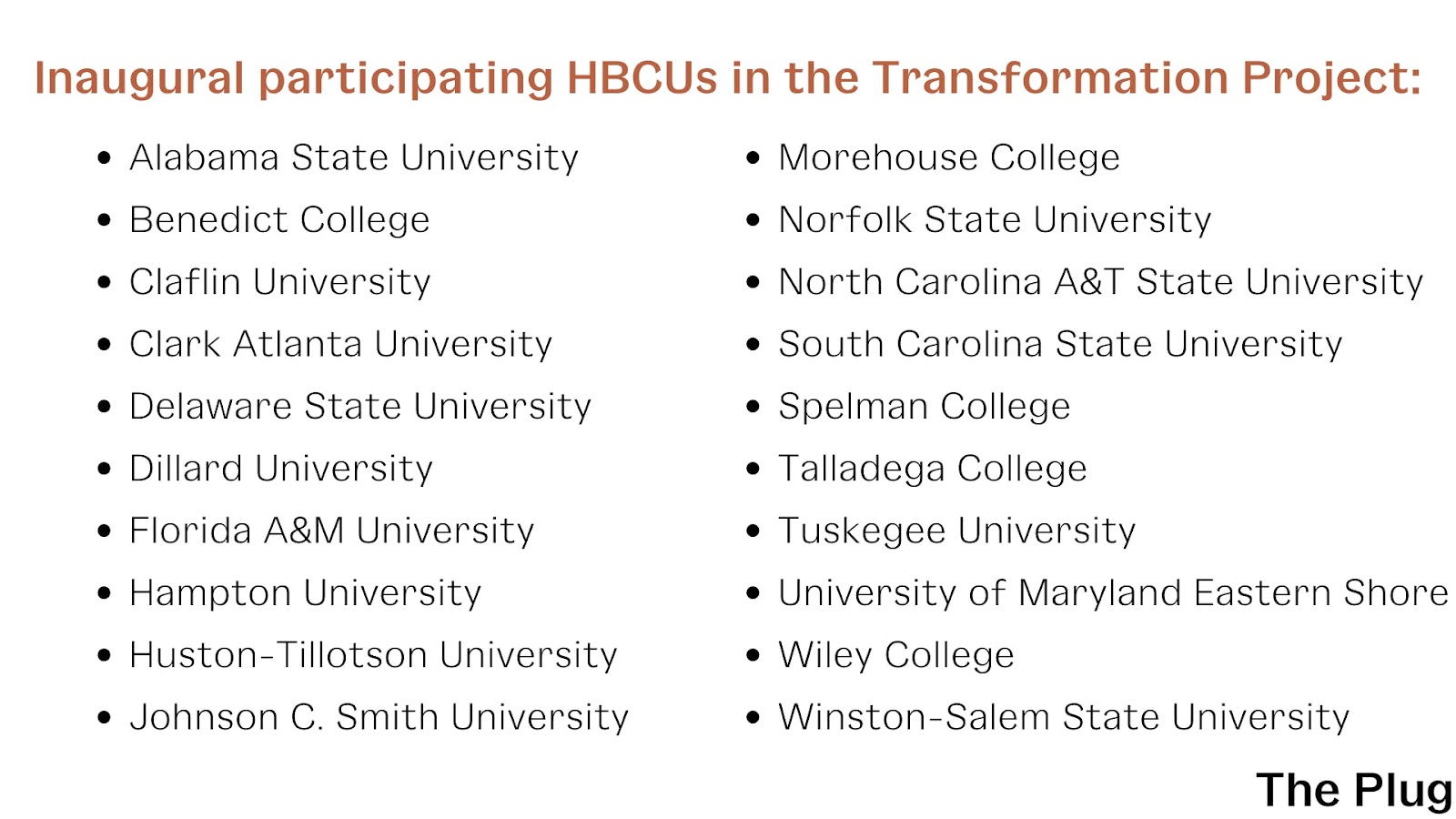Interested in getting HBCU stories straight to your inbox? SIGN UP for our executive HBCU newsletter to make sure you get exclusive videos, news and analysis in your inbox every Wednesday morning.
KEY INSIGHTS
- A new initiative called the HBCU Transformation Project is aiming to transform HBCUs fully into 21st century institutions.
- The initiative was announced with an inaugural group of 20 HBCUs and initial funding of $60 million.
- The eventual goal is to impact every HBCU.
For Jim Shelton, going to Morehouse College shaped the trajectory of his life.
“The reality is that other than what my parents did with me, there’s been no other developmental experience that’s been more important than my years at Morehouse,” Shelton, who serves as the Chief Investment and Impact Officer at the philanthropic platform Blue Meridian Partners, told The Plug.
Yet it was not this experience that drove him in 2020 to want to help HBCUs through the impacts of the pandemic.
“I had been looking at the data around economic and social mobility, which is Blue Meridian’s mission, and in the data it revealed that when you looked at comparable information, HBCUs were outperforming their reasonable peer institutions on economic and social mobility and that they were a powerful platform [not just] for improving economic and social mobility for individuals, but also for the communities surrounding the colleges,” Shelton said.
This fact, coupled with the painfully clear need for HBCUs to transform fully into 21st century institutions, has inspired a new $60 million initiative aptly called the HBCU Transformation Project.
Led by the United Negro College Fund (UNCF), the Thurgood Marshall College Fund (TMCF) and the Partnership for Education Advancement with the funding from Blue Meridian, the initiative aims to create robust digital and physical infrastructures at HBCUs as well as effective wraparound student services so they do not get left behind.
“We want these institutions to be sustainable,” Harry Williams, President of TMCF, told The Plug about the impetus behind the Transformation Project. “We want them to be here another 150 years.”
Through Blue Meridian, a group of high net worth individuals and foundations co-invested the initial $60 million. The Schusterman Family Philanthropies are an outsized donor in the Transformation Project, though Shelton did not specify how much.
The Project has three main objectives: to do deep institutional transformation work, to provide shared services that can benefit institutions and to share the lessons and best practices that can improve outcomes for all HBCUs.
“The hope is that this is an investment that is amortized over decades because of the numbers of students who are impacted by the improvement in the core operations of the institutions,” Shelton told The Plug.
The initiative was announced in March with an inaugural group of 20 HBCUs. The eventual goal is to impact every HBCU.

“When you talk about sustainability, you want to talk about the processes in which you’re recruiting students to your school,” Quinton Ross, Jr., President of Alabama State University, told The Plug. “Then in that recruitment is how you retain them and get them to persist and go all the way to graduation.”
One of the ways the Transformation Project is approaching enrollment and retention is by expanding access to coaching services for HBCU students through a partnership with the nonprofit InsideTrack. Around $3 million is slated to go towards this initiative.
During the initial yearlong pilot in 2021, InsideTrack and UNCF reached out to more than 4,000 HBCU students who had left without finishing. Of those, around a quarter responded yes or no to the coaching offer. Ultimately, 343 students ended up re-enrolling in school.
With this next phase of the coaching program, the services will be offered to a broader group of people. Over the next four years, InsideTrack will provide one-on-one success coaching services for 10,000 potential HBCU students, as well as 4,000 HBCU students enrolled in their first or second year and 3,000 students who left and have not finished their degree.
“Our excitement is really being able to not only get them back in school but proactively keep others in school and also help students thinking about which institution makes sense for them,” Malika Clinkscales, Associate Vice President for Partner Success at InsideTrack, told The Plug.
The Transformation Project is also slated to address core infrastructure needs of HBCUs that often get ignored.
Because of their systematic underfunding, HBCUs have deferred maintenance backlogs, i.e. repairs that were not performed when they should have. In 2018, the Government Accountability Office found that on average, public HBCUs reported deferred maintenance backlogs of $67 million while at private HBCUs it was $17 million.
But $60 million cannot solve all the problems that plague HBCUs.
“Understanding that our institutions are historically and presently under-resourced, $60 million is the tip of a massive iceberg of investment that we need to drive the change that we want in this space,” Ed Smith-Lewis, Vice President of Strategic Partnerships and Institutional Programs at UNCF, told The Plug.
Shelton said that Blue Meridian may invest more in the initiative. He also hopes their investment is catalytic and spurs other individuals and organizations to invest in HBCUs.
The true impact of the Transformation Project though will not be a specific dollar amount. If it is successful, then that means generations of low-income Black students have gotten out of poverty and are moving up the economic ladder. It means that the communities around HBCUs have more resources. It means the contributions HBCUs have made for nearly 200 years are finally respected.
Because as Shelton knows, an HBCU education can be life-changing – transformative even.








